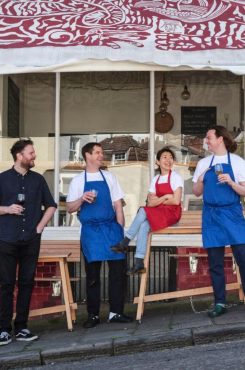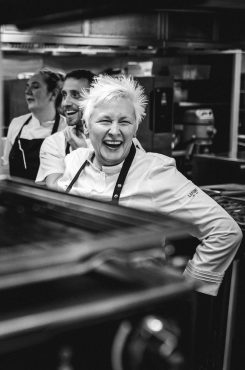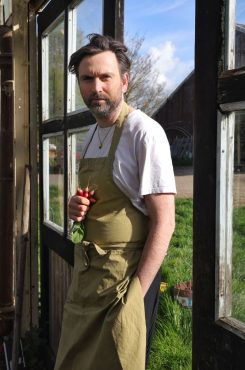CODE meets Mr Yum co-founder and CEO Kim Teo
Published 12 October 2022
sponsored content

CODE caught up with Mr Yum co-founder and CEO Kim Teo to find out what makes the tech guru tick.
As a leader, what has been your approach when it comes to mentorship?
My approach stems from leading by example but also sharing: being transparent about things that are happening in our day-to-day and sharing the data points that we’re collecting, and the paths and decision making. So, rather than just communicating a decision that’s already been made, we share the journey to getting there, as well as the process of raising funding and getting investment – there’s a lot that can be done to demystify that and to share the ups and downs of that process and how it comes together. Everyone wants to give you advice and you may or may not want to take it all on board, but telling someone what to do I don’t think is as powerful as giving them the data points that allow them to make better decisions on their own.
Did you have a mentor?
I don’t have a single mentor that has been on the journey for a big period of my life – instead I had lots of people who believed in me before I believed in myself. When I was really young, I got a bunch of promotions into roles I actually never thought I was fit for, and I had great leaders that saw the benefit in that; providing someone roles they didn’t think they were really ready for, but backing and supporting them. It gives them a lot of confidence and it might be months before you see results, but you’re going to see they made some good decisions.
Capital investment companies can often fund more male-led businesses. Asma Khan recently described it as a ‘boys’ club’. What has been your experience and what is your advice to female entrepreneurs starting out?
So we’ve been funded four times now in our four year journey and I’ve done a lot of the work on raising the capital. Technology is also harder than hospitality for female-led companies to get capital allocated to them.
The job of an investor is to raise the funds and allocate the capital, but you’re competing with other opportunities that also require allocation of capital. I think the only way to escape competition is through being memorable, and being yourself. As a young entrepreneurial female, it’s easier to leave an impression, because [investors] don’t also meet many of you, you’ll be the one person they meet that week that looks and sounds like you, so leaning into that feminine energy I believe is a really important part of being yourself and standing out from the crowd, not being copyable and not copying anyone either.
What can we be doing to champion a more diverse range of voices?
There needs to be a desire from women to talk about their successes, but to be successful you need to create a platform and have a voice. More women need to lean into building that voice, building that profile, and building that brand, and it’s not a selfish thing to do, it’s a relatively selfless thing to do because it can actually be quite annoying!
What are the key challenges you are hearing from operators?
Labour is obviously still a big challenge, but I think everyone is more worried about going into winter, which means having to spend more money on their heating, as well as inflation which is essentially at ten per cent… the good times are still rolling, but the winter is coming.
What advice are you giving your operators?
I think inevitably customers will get more picky about where they go and will want to go to places that guarantee them a good time, as opposed to maybe taking a punt on a new place that they hadn’t heard of before. I know that’s pretty common recession behaviour. So I think for brands we’re thinking, how do we stay close to our customers? How do we know who they are? You need to have a contact list of your customers, you need to be able to talk to them on socials and talk to them on emails, talk to them outside of the restaurant when you want to and remind them that you’re there, remind them that you’re a place for them – a comfortable and consistent and reliable place for them to go and have a good time.
Energy prices, food costs, staffing levels and costs are all making headlines in the industry right now – how is Mr Yum responding to these challenges and supporting its operators?
Everyone in the industry is trying to work out how it’s not a total race to the bottom, because obviously, prices are still going up, and we need to make money somehow. I think being able to fill the restaurant and being able to put bums on seats is still by far the number one most important thing for a restaurant to do. And if you don’t have any access to customers or know anything about them, it becomes an impossible challenge. But to be able to click your fingers and know that you could run a £15 promo and that people will come in on a Tuesday night. So how you choose to be where people go on a Monday, Tuesday and Wednesday, will become a really important thing to stay afloat.
Unfortunately, social media is very spray and pray – you could put something on Instagram, but someone could like it and they’re in a different country. You can’t really manage your communications on a personalised and individual level, which you can if you use a product like Mr Yum. We’re excited to change the conversation from, “we’re a good order & pay solution” to “we’re a way for restaurants to understand their customers better”.
What is your favourite thing about the industry?
I think by far the passion of the people and the fact that they wear their hearts on their sleeve.
What would be one thing that you would change about the industry, if you could?
I really love the idea of being able to democratise the knowledge of how you can leverage technology. We’re definitely big believers that tech can actually do a lot of the heavy lifting.
What are the kinds of innovations or ideas that you’d want to see a bit more of in hospitality?
I’d love to see people have more fun in the innovation space. You think of an idea for something that you can build, and there’s not a huge amount of conversation around how to make it really fun. How do we make this really interesting and exciting, and how do we make it unexpected and magical? I think that’s probably a reminder to us as well. To not just try and tick the box, but try and go one step further.
What keeps you inspired?
Hospitality is a really tough business. It’s a tough industry, people work extremely hard, and could probably make more money doing something else. Obviously, some people do really well out of it, but it’s a sacrifice in the hours [you put in]. So it’s got to be the vision. We’ve got a view of the company we want to create, the products we want to build and the thing that could change the game in hospitality. If we manage to pull it off, it would be one of the coolest things that I’ll be able to spend my lifetime on. There’s so many points where you think about giving up, because you think, ‘we could be doing other things that are so much easier than starting a company from nothing’ and life would probably be a lot easier, if we weren’t having to do all this. But you’ve got to have the vision and love it. You’ve got to love it.




